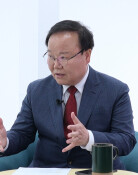Gangneung MBC: A Break In the Presidential Appointment Process
Gangneung MBC: A Break In the Presidential Appointment Process
Posted March. 13, 2005 22:48,
Since the inauguration of Choi Moon-soon, the president of MBC, appointing presidents of provincial Munhwa Broadcasting Corporation (MBC) is progressively causing internal troubles.
MBC was planning to hold a general meeting of stockholders in Gangneung on Thursday to name Cho Seung-pil (50), an inspection commissioner of the head office, as the president of Gangneung MBC. However, the meeting was deferred by Choi Don-woong, a large stockholder of Gangneung MBC.
Choi insisted the invalidity of the meeting, saying, It is unlawful that the head office would change the president at its own discretion without notifying the matter on the agenda.
The head office of MBC decided to hold a general stockholders meeting again at the end of this month, accepting Chois statement.
The head office currently has a 51 percent stake in Gangneung MBC; Choi has a 49 percent stake.
The incumbent president Kim Young-il was selected one year ago by the president recommendation committee, which was organized by a labor-management mutual consent.
An official for Gangneung MBC said, There is strong internal opposition to the fact that the head office is going to change the president, who has more than two years of his term left without any flaw or reason to be changed, on its own authority.
In this personnel affair, the MBC head office decided only two out of 19 provincial presidents of MBC would remain, and changed all of the rest.
The Daegu MBC labor union recently issued an official statement, saying, Unless the transparency of appointing the president is guaranteed, we will definitely fight against it, even by preventing him from attending his office. There are also signs of resistance against the appointment in Gwangju MBC and Jeonju MBC.
Such resistance resulted from pro-reform president Chois administration, which ignored the presidential appointment system of provincial offices, including the president recommendation committee system, and failed to reflect the public sentiment of provincial offices.
A department manager-level executive of a provincial office said, This appointment of the provincial office president seemed to be administered in a way of giving help to some executives, who were relegated by the unprecedented personnel affairs of the head office, and he pointed out, It is problematic that this appointment did not consider provincial employees opinions at all.
It is highly likely that the resistance of provincial MBC offices against the presidential appointment will be more severe, along with the controversial issue of president Chois public commitment, combining provincial offices.
Jung-Bo Suh suhchoi@donga.com
Headline News
- Med professors announce intention to leave hospitals starting Thursday
- Bridge honoring Sgt. Moon Jae-sik unveiled in Pennsylvania
- Chief of Staff Chung tells presidential secretaries to stay away from politics
- US FTC bans noncompete agreements
- N. Korea launches cyberattacks on S. Korea's defense companies







